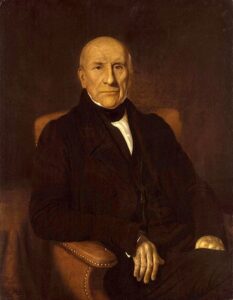
*Sir John Gladstone, 1st Baronet
*Sir John Gladstone, 1st Baronet, was born on this date in 1764. He was a white Scottish merchant, slave owner, and politician.
Born John Gladstones on King Street in Leith, north of Edinburgh, Scotland, he was the eldest son of the merchant Thomas Gladstones and his wife, Helen Neilson. He was the second of the family's sixteen children. Gladstones left school at 13 in 1777 and was apprenticed to the Edinburgh Roperies and Sailcloth Company ropeworks in Leith.
On completing his apprenticeship in 1781, he entered his father's slave-labored corn and flour trading and provisioning business. Gladstone acquired large sugar plantations in Jamaica and Demerara and was Chairman of the West India Association. The Demerara Rebellion of 1823, a slave revolt, happened on his plantation in the colony of (in present-day Guyana) and was crushed by the army and militia. The leader of the Demerara revolt of 1823 was Quamina Gladstone, an enslaved man who worked as a cooper on the "Success" plantation owned by John Gladstone. He was named Gladstone following the convention of the enslaved taking the surnames of their masters.
Sir John Gladstone also sat in Parliament from 1818 to 1827. Gladstone's involvement in slavery heavily influenced the proslavery thought of his son during his early political career. With help from his son William, Gladstone was awarded a payment as a slave owner in the aftermath of the Slavery Abolition Act 1833 with the Slave Compensation Act 1837. Gladstone's claim was the single largest of any recipient made by the Slave Compensation Commission, and he had the largest number of slaves. Gladstone was associated with eleven different claims. He owned 2,508 slaves in British Guiana and Jamaica and received a £106,769 payment (equivalent to £12,250,000 in 2023).
After the abolition of slavery, Gladstone sought indentured laborers from India to work in his sugar plantations from Messrs Gillanders, Arbuthnot & Co. of Calcutta. The conditions imposed on the indentured laborers were so appalling that they fled in numbers, and Gladstone abandoned the 'experiment.' Whilst trying to recruit indentured laborers, he wrote that the work in the sugar plantations was light and conditions generally good, including schools and medical attention.
This was a picture he had derived from information given by plantation managers, who did not communicate the routine abuse of slaves nor their malnutrition, overcrowding, and overwork. It ignored the comprehensive and damning evidence on the reality of slavery in the British and French Caribbean, provided by many writers of the time, such as missionaries and other returning Britons.
The appalling reality of lives on the Gladstone-owned plantations in Demerara is well documented. In 1838, using the wealth he had amassed from his plantations and other business ventures, John Gladstone paid for several philanthropic works in his original hometown, including St Thomas's Church, an adjacent manse, a free school for boys, a free school for girls, a "house for female incurables," and a public rose garden. In 1846, Gladstone was created a baronet by the outgoing Prime Minister, Sir Robert Peel. He is best known for being the father of British Prime Minister William Ewart Gladstone. Sir John Gladstone died on December 7, 1851.